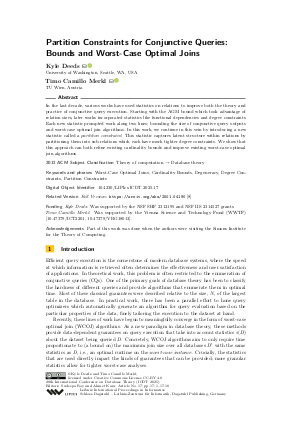LIPIcs.ICDT.2025.17.pdf
- Filesize: 0.82 MB
- 18 pages

 Creative Commons Attribution 4.0 International license
Creative Commons Attribution 4.0 International license

In the last decade, various works have used statistics on relations to improve both the theory and practice of conjunctive query execution. Starting with the AGM bound which took advantage of relation sizes, later works incorporated statistics like functional dependencies and degree constraints. Each new statistic prompted work along two lines; bounding the size of conjunctive query outputs and worst-case optimal join algorithms. In this work, we continue in this vein by introducing a new statistic called a partition constraint. This statistic captures latent structure within relations by partitioning them into sub-relations which each have much tighter degree constraints. We show that this approach can both refine existing cardinality bounds and improve existing worst-case optimal join algorithms.

Feedback for Dagstuhl Publishing